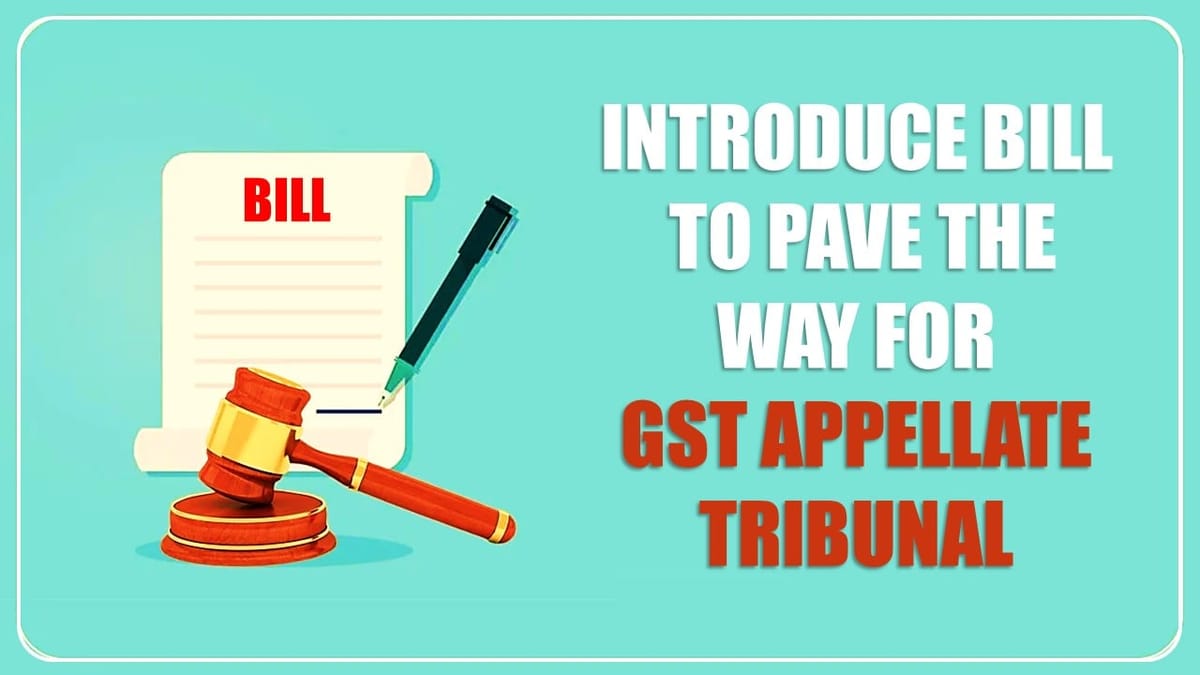Priyanka Kumari | Nov 18, 2023 |

Government to introduce 2 key bills to pave the way for GST Appellate Tribunal
The government is going to introduce two major bills in the upcoming winter session to pave the way for Goods and Services Tax (GST) appellate tribunals and seek approval for changes in its expenditure plans, according to two people familiar with the plans.
A person acquainted with the plan said on the condition of anonymity that the bill amending the central GST law will propose that advocates with litigation experience be appointed as judicial members in GST appellate tribunal benches.
In an attempt to make it easier to find appropriate members, the age criteria will be reduced from what was originally intended.
According to a second person, the government would also introduce bills to seek Parliament‘s approval for adjustments to the Centre’s Rs. 35 trillion-dollar spending programme for the current financial year.
The Supplementary Demand for Grants for the Year is expected to accommodate modifications in the Centre’s expenditure program without major net additional fund expenditure.
The winter session of parliament is set to commence on December 4th.
The government will maintain its financial deficit target of 5.9% for the current financial year. The Bill will seek to reallocate savings from some categories of spending to where there is an additional need.
The nutrient-based fertilizer subsidy is one area where more funding is required. The government spent 96 % of the Rs. 44,000 crore allotted for this purpose at the start of the financial year in the beginning.
According to government data, total food, fertilizer, and petroleum subsidy spending up to September was 55 % of the 3.7 trillion planned for the year. The government needs Parliament’s approval for additional spending, even if it can be satisfied through savings in another category.
According to experts, the additional spending requirement is largely related to externalities. The government’s financial performance is predicted to be nearly in line with projections. Even if there is some slippage, it will be marginal,” said D.K. Srivastava, principal policy adviser.
The much-anticipated set of amendments to the Insolvency and Bankruptcy Code (IBC) to provide a regime for dealing with financial distress at the group level of corporations and to offer a special regime for real estate, on the other hand, are unlikely to make it to the winter session because the proposals are still not final.
At the moment, IBC only provides debt settlement at the individual company level. Also, a set of proposed amendments to the Companies Act to revamp the statutory audit regime may not make it to the winter session. It would imply that they would not be cleared during the current Lok Sabha’s term.
However, a third individual with knowledge of the government’s discussions stated that work was being done on these fronts. An email addressed to the finance and corporate affairs ministries‘ spokespersons on Thursday seeking comment for the report went unanswered.
The Constitution (One Hundred and Sixth Amendment) Act, 2023, popularly known as the women’s reservation law, was passed by the House in a special session held in September, reserving one-third of all seats in the Lok Sabha and state legislative assemblies for women.
The winter session of parliament begins a day after the counting of results for assembly elections in five states—Chhattisgarh, Mizoram, Madhya Pradesh, Rajasthan, and Telangana.
In case of any Doubt regarding Membership you can mail us at [email protected]
Join Studycafe's WhatsApp Group or Telegram Channel for Latest Updates on Government Job, Sarkari Naukri, Private Jobs, Income Tax, GST, Companies Act, Judgements and CA, CS, ICWA, and MUCH MORE!"